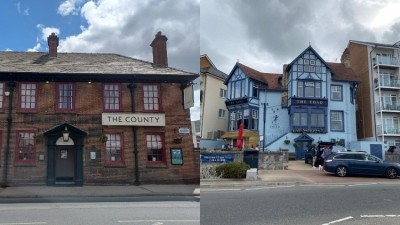LICENSING HUB - LEGAL WITH POPPLESTON ALLEN
Avoiding cracks in your pavement licence

What is a pavement licence?
A pavement licence is a licence granted by a local authority that allows the licence-holder to place removable furniture over certain highways adjacent to the premises for certain purposes, most commonly the placing of tables and chairs on pavements for outside dining and drinking. Where a pavement licence is granted, clear access routes on the highway will need to be maintained, taking into account the needs of all users, including persons with disabilities.
Who’s eligible?
Any business which uses (or proposes to use) a premises for the sale of food or drink for consumption on or off the premises can apply for a licence. Businesses that are eligible include: public houses, bars, cafes, restaurants, coffee shops and others. The licence permits furniture to be used by customers for consumption of food or drink supplied from the premises.
The previous process
Historically, up until the pandemic pavement licences were pretty much exclusively granted under The Highways Act 1980. It is important to mention that this option is still (for now) available for operators if they choose. Some of the perceived drawback from use of The Highways Act licence procedure is that the application fee varies between local authorities and can be quite substantial alongside the fact that there is a minimum 28-day consultation period before the application can be deemed granted.
Introduction of the Business & Planning Act
During the coronavirus pandemic the pavement licence process changed with the introduction of The Business & Planning Act as a temporary measure with the aim to allow businesses in England selling food or drink to obtain authorization from the local authority to place tables and chairs on the pavement more quickly and cheaply.
The fee for applying for a licence under the Business and Planning Act process is capped at £100 and the public consultation period is 7 days (excluding public holidays) with an additional determination period of 7 days starting after the consultation period. If no representations are received the licence is deemed granted. The licence is deemed to be granted for a year (but not beyond 30 September 2023).
This temporary measure was originally due to expire on 30 September 2021, but in July 2021 the Government extended that period until 30 September 2022 and it was extended again in July 2022 which allowed the licence provisions to continue until 30 September 2023. There is currently yet another one-year extension awaiting approval by parliament which should take us to September 2024.
Reception
Overall, the introduction of the fast-track system has been a success and has been well received across the hospitality industry. Many national operators and independents alike have taken the opportunity to extend their trade to external areas as a result. The process has been viewed as a streamlined and cheaper route, and a hugely attractive means of boosting trade for operators particularly during the sunnier months.
What’s next?
The Levelling Up and Regeneration Bill proceeding through Parliament proposes to make the Fast Track Pavement Licence regime permanent. However, there are some proposed changes to the existing regime - the fee will be £500 pounds for new licences instead of £100, and £350 for a renewal, and the consultation and determination periods will be extended from seven days to 14 days respectively [in effect 28 days for consultation and determination].
Importantly once the Levelling Up Bill comes into force applications for licences under the old Highways Act will no longer be permissible. As to when the Bill receives Royal Assent we simply don’t know, but given that the government has recently commenced a third extension of the temporary regime until September 2024 it evidently doesn’t anticipate the Levelling Up Bill achieving Royal Assent before September 2023.
Until then our advice is that if your licences come up in the meantime, to renew them as usual under the Highways Act or Business and Planning Act.
- Alex Tomlinson is a trainee solicitor at Poppleton Allen solicitors.







